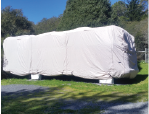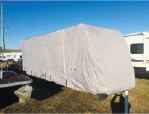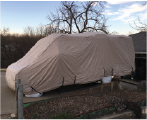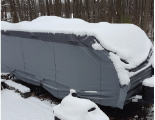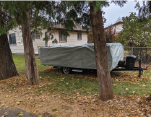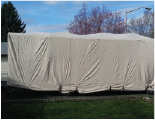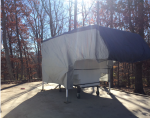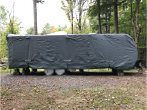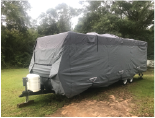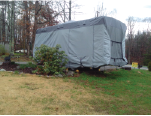
Have you ever bought a cover for your camper trailer, only to realize it didn’t fit quite right? You’re not the only one! Many people think that sizing for camper trailer covers is a piece of cake. But honestly, getting that size just right is one of the biggest keys to keeping your camper protected.
It's tempting to think "close enough" will do the trick. However, with camper covers, "almost" can lead to some real headaches, like tears, leaks, or even mold. Whether you're tucking your camper away for the season or just for a few weeks, the right-sized cover makes a huge difference.
So, let's dive into the common sizing slip-ups people make while choosing RV camper covers and how you can easily avoid them.
Why the Right Cover Size Matters
A good trailer camper cover is meant to act like a protective shield, guarding your trailer against rain, snow, harsh sun, dirt, or anything you name. But here’s the catch: for that protection to really work, it needs to fit just right. We're talking Goldilocks-level fit: not too tight, not too loose.
So, what exactly goes wrong if the coverage does not fit properly?
If a cover is too small, it won't do its job. It might not stretch or cover the whole of the trailer and therefore expose parts of the trailer. It is also much more susceptible to ripping during storage.
On the flip side, if the cover is too big, it will act like a sail instead, allowing moisture and dirt into the cover. It can also hold and pool rainwater, allowing it to sag heavily.
Then there's the wrong shape issue. Trying to force a standard RV cover onto something like a pop-up or truck camper means it won't conform to your trailer's lines, creating gaps where your trailer is vulnerable.
In the end, while the size/type of the cover is important to make your camper look good, it is mostly important for optimal protection of your camper.
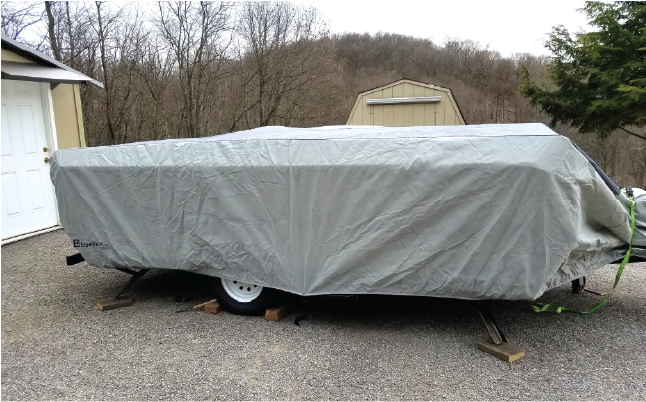
Common Mistakes Buyers Make When Choosing Trailer Camper Covers
When it comes to choosing the right cover for a camper trailer, it's easy to assume you know the size perfectly. But that can lead to some common mistakes. Here are a few pitfalls to watch out for:
Guessing the Length
Trusting your memory or relying solely on your owner's manual can be a bit of a gamble. Even trailers that look alike can have different measurements. The smartest move? Just grab a tape measure and measure the length from end to end yourself.
Forgetting About Your Add-Ons
Think about anything that sticks out on your camper—ladders, spare tires, bike racks, even your air conditioner. All this contributes to the length or height. Failing to take them into account when you are taking the measurement, you may find that your cover cannot extend far enough.
Using the Wrong Type of Cover
Not all camper covers are built the same way. For example, a cover that fits a truck camper is unlikely to fit a pop-up or a travel trailer correctly. When looking to buy a cover, ensure that the one you want is one that fits your type of camper.
Ignoring the Manufacturer's Sizing Chart
This is a big one! Don't just assume a "24-foot" cover from one brand is the same size as a "24-foot" cover from another. Every brand sizes its covers a bit differently. You really need to compare your camper's actual measurements to the sizing guide that the cover manufacturer provides.
How to Measure Your Camper the Right Way
To make absolutely sure you snag the perfect cover for your camper trailer, just follow these three simple steps:
Measure the Length: Start right at the very front edge of your trailer. Decide if you want the hitch covered; if so, measure from the tip of it. Then, stretch your tape measure all the way to the very back bumper or the end of your ladder. That's your total length!
Measure the Width: Find the widest part of your camper's body—usually somewhere across the middle. Just remember not to include things like mirrors that stick out or any parts you can easily remove.
Measure the Height: Go from the ground straight up to the tallest permanent thing on your camper, whether that's the roof itself or your AC unit.
Once you have these numbers, write them down! Then, before you click "buy," double-check them against the cover's specific size chart. You'll be glad you did!
How to Pick a Well-Fitting Cover
A good fit does not only imply that you have the right size but also that it can fit and keep your camper cover in place. This is what should also be observed:
- Elastic hems around the bottom edge are a big plus. They help the cover hug your camper snugly, keeping it from flapping too much.
- Zippers for access are a lifesaver! You can just open a section and get into your camper without taking the whole cover off. So convenient.
- Built-in straps or buckles are non-negotiable. They'll keep that cover cinched down tight, so you don't have to worry about strong winds trying to steal it away.
- And make sure the fabric can breathe. This lets air move around, which is super important for stopping gross mold and mildew from setting up shop underneath.
When you nail both the sizing and these little details, your RV camper cover will seriously last longer and keep your camper looking good as new.
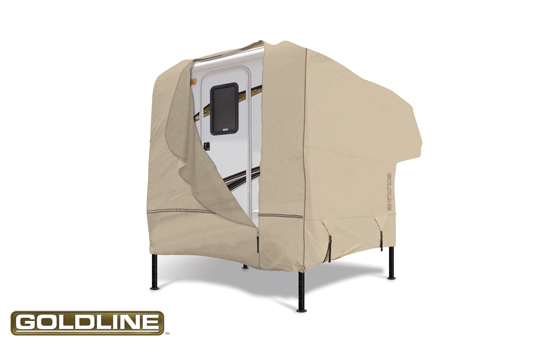
Why “One Size Fits All” Doesn’t Work
You might see some rv covers advertised as fitting a whole bunch of trailer sizes. That might sound super easy, but usually, it just means the fit won't be perfect. If your camper has a unique shape or extra bits, these "one-size" covers often won't protect it properly.
Think about what can happen:
- A cover that's too big can flap around in the wind and actually rub against your trailer, which can wear down the paint over time.
- And if it's too small, well, then parts of your camper will just be left out in the open, totally vulnerable to the sun, rain, or whatever else comes along.
- That's why it's genuinely worth taking a little extra time to choose a size that matches your camper exactly. It really makes a difference in the long run.
Conclusion
To sum it all up, finding the right trailer cover isn’t just about keeping your camper safe; it’s really about saving you some money and avoiding a whole lot of future headaches. If the cover doesn’t fit well, you could end up wasting money and even causing damage to your camper.
So, before you make a purchase, grab a measuring tape and double-check that the cover you choose matches the full length, width, and height of your camper perfectly.

.png)
